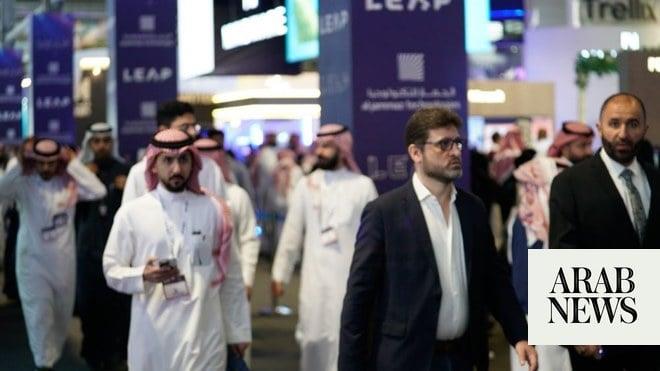
RIYADH: One of the topics high on this year’s LEAP agenda was how technological enterprise could combat climate change.
And global consulting firm PricewaterhouseCoopers is one company that has been pushing innovative approaches and solutions to decarbonize sectors across the global economy.
Its role as LEAP’s digital consulting partner for the second year running also reflects Saudi Arabia’s expanding role and hub for tech.
Stephen Anderson, PwC’s Middle East strategy and markets leader, told Arab News: “I think LEAP itself is quite a good sort of microcosm of everything that’s happening here in Saudi Arabia.
“Due to Vision 2030, everything in Saudi Arabia appears to be ramping up to the next level. I think we’ve gone beyond transformation now. We’re now talking about reimagination.
“We’re seeing a real leap in terms of our moves into artificial intelligence, the metaverse, and cloud,” he said.
PwC’s presence at LEAP has highlighted its technological areas of smart cities, the metaverse, and AI and the role that all can play in combatting climate change.
Yahya Anouti, environmental, social, and corporate governance lead partner for strategy and energy at PwC, told Arab News: “From a broader perspective, we have a big climate change challenge, and this has two things we need to think of.
“First at the global level, the 1.5 degrees scenario is at risk, and we have to mobilize again our efforts and show the world that we can come and stay the course on the 1.5-degree scenario.”
The challenge involves holding warming to 1.5 degrees Celsius above pre-industrial levels to limit the most dangerous and irreversible effects of climate change.
He said: “Secondly, the Middle East as a region is known to be water scarce, with the impact of climate change being felt more here than the rest of the world. We have to innovate solutions for the region.” Anouti pointed out that the region was uniquely endowed to lead the world on multiple technologies.
“The hydrogen economy producing hydrogen molecules, ammonia, synthetic fuels, et cetera, is becoming the hub for green industries like green steel and green titanium. We need to see how we can use green energy to produce alternative protein for precision fermentation and so on,” he added.
PwC is also working with clients to help foster smart cities or technologically modern urban areas that use various types of electronic means and sensors to gather data.
The firm is extensively working toward implementing cutting-edge technology through a network of devices, sensors, systems, and apps, which aim to achieve a city’s goals related to economy, infrastructure, efficient operations, and ensuring quality life to its citizens and residents.
On cognitive buildings, Rajat Chowdhary, PwC’s Middle East partner in technology consulting, said: “They are essentially conscious buildings. These buildings are like a living lab and understand the way occupants interact with them to learn from them how to behave to enable a personalized experience in the future.
“These buildings have data coming in from many AI-enabled devices which are installed in the buildings. They could be your sensors, your lighting, your heating, ventilation, and air-conditioning systems.
“This data is then correlated to give you a customized, personalized experience, not just for the occupant, but for the environment as well. This is why we love calling them conscious buildings.”
Chowdhary noted that this could, “immensely contribute toward the cause of combatting climate change.”
As an example, he pointed out how cognitive buildings could use elements related to energy efficiency to bring about a direct cut in an occupant’s electricity bill as well as the building’s total energy consumption.
“Such energy efficiency then has a dominant effect on how the occupant is consuming other things,” he added.
Climate change through advanced technology could have a domino effect with its use in one area spurring that in another.
“Cognitive buildings play a very crucial role in the whole smart city concept,” Chowdhary said, describing them using the acronym SET or sustainability, efficiency, and technologically advanced.
“These smart cities would have different goals for themselves, which is what makes them smart. They would focus on sustainability, liveability — around making sure you have better energy and waste management,” he added.
Anderson said the Middle East was shining a beacon for technology change and economic growth. PwC’s 26th chief executive officers survey involved interviews with 4,000 CEO’s from around the world to compile the finding for its 2023 report.
“Our CEOs were by far the most confident in their own market. Over two-thirds were very confident in the growth of the region compared to in North America and in Europe, where only 20 percent of CEOs saw growth.
“Our CEOs in the Middle East are realistic, though. They recognize there are challenges in the rest of the world and that they need to change. They recognize the need to change but are not slowing down on investments, they see the need to diversify and to drive more efficient products,” Anderson added.
According to the PwC survey, 85 percent of CEOs in the Middle East said they would be investing more into technology.
Anderson said: “About two-thirds said they were going to go to the cloud, they’re going to do AI, they were going to work on metaverse. About 75 percent said they were going to invest specifically in upskilling their workforce from a technology perspective.”
But, he added, the big and impressive finding was the importance of climate change and ESG.
“Last year, only 10 percent of CEOs said it was on their agenda and this year, perhaps as a result of COP27 and COP28 (climate change conferences), over half said they were thinking of adjusting their products to think about their impact on climate.”











